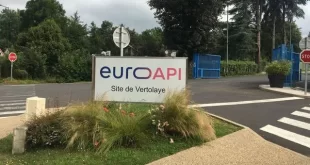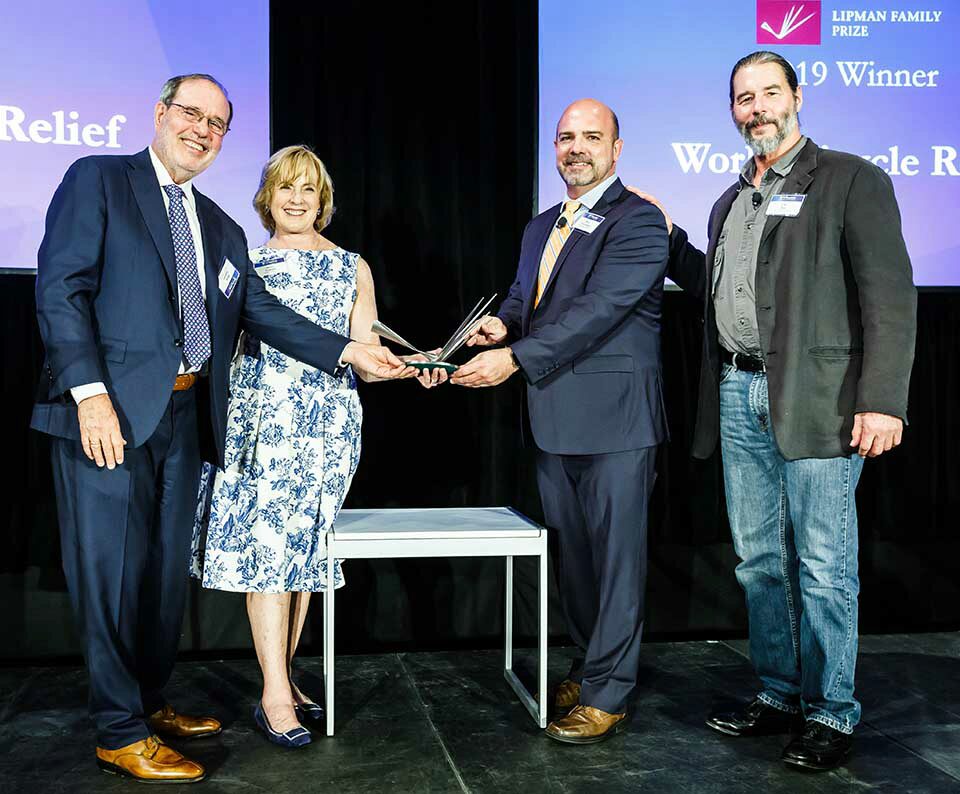Award Components
Each year, the Lipman Family Prize selects three winners. The grand prize winning organization receives a $250,000 unrestricted cash award, and the two additional winning organizations each receive a $125,000 unrestricted cash award.
In addition, all three winners receive the same non-monetary benefits including:
1
An ongoing partnership with the University dedicated to knowledge sharing and support of the organization, including opportunities for resources and relationships to help scale the work or improve organizational sustainability.
2
Promotion of their work and accomplishments to a large audience, and network development within the Lipman Prize community of winners, and the broader Penn network.
3
Access to tuition-free executive education programs at the Wharton Executive Education and the Center for Social Impact Strategy, valued at approximately $15,000.
4
The exclusive Lipman Nonprofit Leadership Scholarship, given in partnership with the University’s School of Public Policy and Practice, valued at approximately $10,000.
Lipman Family Prize Confidentiality Statement – All materials shared with the Lipman Family Prize as part of our application process will be kept confidential. If there is a desire to share any data related to individual applicants, the Lipman Prize will make a direct request for permission.
Eligibility
Winners can be working in any geographic region, and making a positive impact in addressing any globally relevant social challenge of public interest. We encourage organizations working anywhere in the world to apply. Organizations do not have to operate outside of their home country to win the Prize. See below for eligibility details.
Eligibility Criteria
Relationship with the University of Pennsylvania
Previous Applicants
Applicant Profiles
Recent Statistical Centers
Over the past five years, applicants that have reached the semi-finalist stage (top 10-15 organizations) have been represented by a wide range of organizational profiles, with these statistical centers below. These statistics, along with our Winner Profiles, offer prospective applicants a sense of the types of organizations that perform well in the Lipman Family Prize application cycle. We recommend that organizations review this information before submitting an application for the Prize.
Median Organizational Budget
$2.7 million USD
Average Organizational Budget
$4.2 million USD
(The middle 50% of the last 5 years of semi-finalist applicants’ budget sizes were between $1.5 – $4.3 million USD, with the full range between $500,000 and $8.1 million, excluding outliers)
Median Organizational Age
12 years
Average Organizational Age
13 years
(The middle 50% of the semi-finalist organizations in the last 5 years have been between 9 and 16 years old, with the full range between 4 to 25 years old, excluding outliers)
Alignment with the Lipman Prize
In addition to meeting our eligibility criteria listed above, the most successful applicants tend to:
- Exemplify each of the 4 evaluation criteria described above: leadership, impact, innovation, and transferability;
- Tell a cohesive story about their organization that describes the social challenge, explains how they have chosen to address this problem and why they have chosen this solution, and what the impact and positive change has been for the intended beneficiaries;
- Have deep roots in the community being served;
- Have a proven effective delivery model and capacity for growth;
- May not yet have gained significant recognition, but is building a track record of success;
- Have a demonstrated learning orientation within the organization’s leadership and culture;
- Be interested in the non-monetary benefits and partnership opportunities associated with the Lipman Family Prize’s unique base within the University of Pennsylvania; and
- Want to be an active participant and peer learning partner in the growing community of Lipman Prize winning organizations.
Application Process
We have deep respect for change-makers implementing cutting-edge solutions to poverty and inequality around the world and review each application to the Lipman Family Prize with thoughtfulness and care.
Our application process consists of four main phases- application submission and reviews, due diligence, selection of the winners and partnership development. Applications are reviewed under the supervision of staff and faculty at the University of Pennsylvania. All applicants will be notified in September whether or not they will continue to be considered in that year’s selection process. The winners and grand prize winning organization will be announced in April. The grand prize winner and two other winning organizations will attend a special award ceremony and related events held at the University of Pennsylvania.
Please see below for a detailed breakdown of each of these phases.
PHASE 1: Open Application Round
Timeframe: July – September
This first phase of the application is open to any organization that meets the eligibility criteria outlined above. This first round includes essay questions across the 5 themes listed below, basic organizational profile information, and the submission of existing financial statements that demonstrate the eligibility criteria has been met.
Applicant Requirements
Applicants submit an online application during this open application period, which typically opens on July 1 each year for one month. The current cycle’s specific dates can be found in the “Important Dates” tab.
Review Process
Each year, we typically receive around 100 applications in the open submission period. We invite a team of trained reviewers from our Lipman Prize community to review the applications using a quantitative assessment framework that focuses on the 4 evaluation criteria of leadership, impact, innovation, and transferability.
Essay Questions
Phase 1 essay questions are intended to give applicants the opportunity to tell their story. Every organization has a story, and we want to learn about yours. The essay questions are organized into 5 themes:
- Social Challenge: These questions ask for background information about the societal problem(s) your organization aims to solve in the geographical context(s) you operate, as well as the global relevance of this social challenge. Help us understand the problem being addressed.
- Model Description: These questions ask to explain what the organization does. Given the social challenge described above, how has your organization chosen to address this challenge?
- Model Differentiation: As innovation is a key evaluation criteria for the Lipman Family Prize, these questions ask to explain the distinct approaches and practices your organization has adopted to address the social challenge your organization addresses.
- Impact Measurement: These questions ask for both a process description and for actual impact results. These questions aim to understand your monitoring and evaluation process and how your organization assesses the impact of the model described above in addressing the social challenge addressed above. These questions also are the opportunity to share your organization’s impact data.
- Transferability: These questions aim to understand how your organization’s model has the potential to transfer to other geographical contexts, or to other issue areas, essentially sharing knowledge assets for the benefit of the wider social impact community.
End Result
A subset of 24-40 organizations are invited to advance to Phase 2 of our application process. All applicants are notified in September as to whether they are chosen for further review in Phase 2.
Job Features
| Job Category | Opportunity |
 Etudes Non Stop Study Non Stop
Etudes Non Stop Study Non Stop




 “As a University built on new ideas, passionate people, and practical pursuits, the University of Pennsylvania is delighted to welcome the Lipman Family Prize honorees as members of the Penn and Wharton community who are having a positive impact on the world.”
“As a University built on new ideas, passionate people, and practical pursuits, the University of Pennsylvania is delighted to welcome the Lipman Family Prize honorees as members of the Penn and Wharton community who are having a positive impact on the world.”
